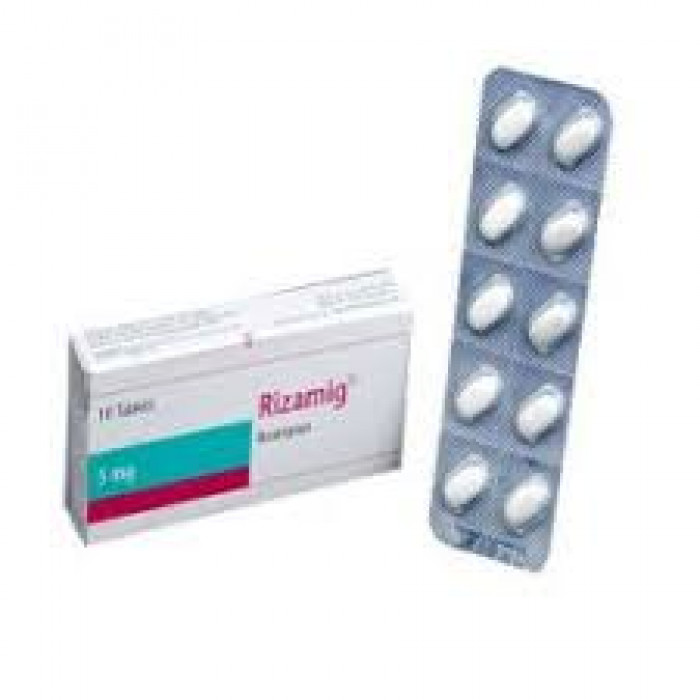
✔ 100% Authentic Product
👁️ Currently Viewing 1903
Rizamig 5mg 10pcs
Tablet Manufacturer/Distributor: Healthcare Pharmaceuticals Ltd. Generic Name: Rizatriptan 5 mg Tablet
📄Prescription Required
Discount
Price: ৳ 334
MRP:
৳
355
6%
Off
✅ Description:
Indications
Rizatriptan benzoate is indicated for the acute treatment of migraine with or without aura in adults and children aged 6 to 17 years.
Pharmacology
Rizatriptan has a high affinity for the cloned human 5HT1B / 1D receptor. It is speculated that rizatriptan benzoate may play a therapeutic role in the treatment of migraine by binding to 5HT1B / 1D receptors located in intracranial blood vessels and sensory nerves of the trigeminal nervous system.
Dosage & Administration
Dosing Information In Adults: The recommended starting dose of Rizatriptan Benzoate is either 5 mg or 10 mg for the acute treatment of migraines in adults. The 10-mg dose may provide a greater effect than the 5-mg dose, but may have a greater risk of adverse reactions.
Redosing In Adults: Although the effectiveness of a second dose or subsequent doses has not been established in placebocontrolled trials, if the migraine headache returns, a second dose may be administered 2 hours after the first dose. The maximum daily dose should not exceed 30 mg in any 24-hour period. The safety of treating, on average, more than four headaches in a 30-day period has not been established.
Dosing Information In Pediatric Patients (Age 6 to 17 Years): Dosing in pediatric patients is based on the patient's body weight. The recommended dose of Rizatriptan Benzoate is 5 mg in patients weighing less than 40 kg, and 10 mg in patients weighing 40 kg or more.
The efficacy and safety of treatment with more than one dose of Rizatriptan Benzoate within 24 hours in pediatric patients 6 to 17 years of age have not been established.
Dosage Adjustment For Patients On Propranolol: Sections or subsections omitted from the full prescribing information are not listed.
Adult Patients: In adult patients taking propranolol, only the 5-mg dose of Rizatriptan Benzoate is recommended, up to a maximum of 3 doses in any 24-hour period (15 mg)
Pediatric Patients: For pediatric patients weighing 40 kg or more, taking propranolol, only a single 5-mg dose of Rizatriptan Benzoate is recommended (maximum dose of 5 mg in a 24-hour period). Rizatriptan Benzoate should not be prescribed to propranolol-treated pediatric patients who weigh less than 40 kg
Administration of Rizatriptan Benzoate Tablets, administration with liquid is not necessary. Orally disintegrating tablets are packaged in a blister within an outer aluminum pouch and patients should not remove the blister from the outer pouch until just prior to dosing. The blister pack should then be peeled open with dry hands and the orally disintegrating tablet placed on the tongue, where it will dissolve and be swallowed with the saliva.
Interactions
Propranolol: In patients receiving propranolol, the dose of rizatriptan should be adjusted because propranolol has been shown to increase the plasma AUC of rizatriptan by 70%.
Ergot-containing drugs: According to reports, ergot-containing drugs can cause long-term vasospasm. Because these effects may be additive, the use of ergotamine or ergotamine drugs (such as dihydroergotamine or mexiergot) and rizatriptan within 24 hours are contraindicated.
Other 5HT1 agonists: because of their The effect of vasospasm may be additive, combined use of rizatriptan and other 5HT1 agonists
SSRI / SNRI and serotonin syndrome within 24 hours: while taking triptans and selective serotonin reuptake inhibition Cases of serotonin syndrome have been reported in patients with SSRIs (SSRIs) or SSRIs 5-hydroxytryptamine norepinephrine (SNRI) taking
monoamine enzyme inhibitors: Rizatriptan is a contraindicated MAOA inhibitor and non-selective Sex MAO inhibitor. A specific MAOA inhibitor increases the systemic exposure of rizatriptan and its metabolites.
Contraindications
Rizatriptan Benzoate is contraindicated in patients with:
Ischemic coronary artery disease (angina pectoris, history of myocardial infarction, or documented silent ischemia), or other significant underlying cardiovascular disease
Coronary artery vasospasm including Prinzmetal's angina
History of stroke or transient ischemic attack (TIA)
Peripheral vascular disease (PVD)
Ischemic bowel disease
Uncontrolled hypertension
Recent use (i.e., within 24 hours) of another 5-HT1 agonist, ergotamine-containing medication, or ergot-type medication (such as dihydroergotamine or methysergide)
Hemiplegic or basilar migraine
Concurrent administration or recent discontinuation (i.e., within 2 weeks) of a MAO-A inhibitor
Hypersensitivity to Rizatriptan Benzoate (angioedema and anaphylaxisseen)
Side Effects
The following adverse reactions are discussed in more detail in other sections of the labeling:
Myocardial Ischemia, Myocardial Infarction, and Prinzmetal's Angina
Arrhythmias
Chest, Throat, Neck and/or Jaw Pain/Tightness/Pressure
Cerebrovascular Events
Other Vasospasm Reactions
Medication Overuse Headache
Serotonin Syndrome
Increase in Blood Pressure
Pregnancy
Pregnancy: Inform patients that rizatriptan benzoate should not be used during pregnancy unless the potential benefit justifies the potential risk to the fetus.
Nursing Mothers: It is not known whether this drug will be excreted in human milk. Because many drugs are excreted in human milk, caution should be exercised when administering rizatriptan benzoate to breast-feeding women. Rizatriptan is extensively excreted in rat milk and the level in milk is at least 5 times higher than the level in maternal plasma.
Precautions
Elderly; mild to moderate liver or kidney failure; coronary artery disease; pregnancy, breastfeeding. May cause drowsiness. History of seizures. After stopping the ergotamine compound and starting the serotonin agonist (5HT1), make sure to wait at least 24 hours.
Storage Conditions
Store at 15-30° C.
⚠️Disclaimer:
At ePharma, we’re committed to providing accurate and accessible health information. However, all content is intended for informational purposes only and should not replace medical advice from a qualified physician. Please consult your healthcare provider for personalized guidance. We aim to support, not substitute, the doctor-patient relationship.






